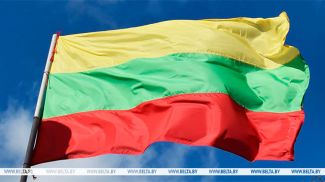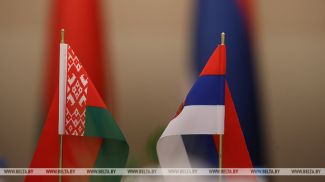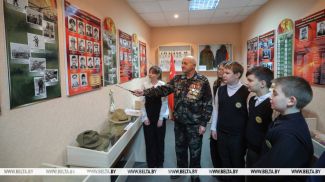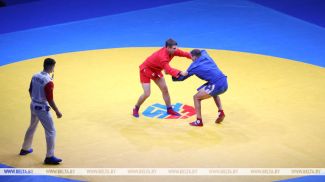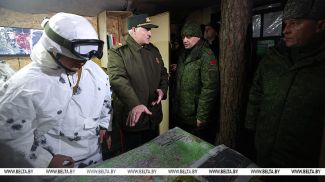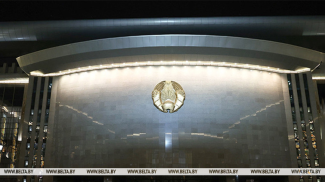
News of the story
"President's Week"
The work schedule of the Belarus president is always full of events. Aleksandr Lukashenko holds conferences and working meetings on the most topical matters concerning the country’s development, regularly visits the regions, goes on foreign trips and welcomes foreign guests, talks to reporters, signs decrees and laws. And even if there are no public events, it does not mean that the head of state does not work. It must be said that even when he relaxes, for instance, by playing ice hockey or chopping firewood, Aleksandr Lukashenko happens to find the time to give yet another instruction. All the decisions must be prompted by life, he likes to say.
The President’s Week project is intended for those, who want to keep up with the head of state, be up-to-date on the latest statements and decisions of the Belarusian leader.
Aleksandr Lukashenko’s latest work week was very versatile. It focused heavily on further tuning of the work of the Belarusian People’s Congress, the safety of the country’s aerial borders, work in agriculture, regional development, financing for culture, and traditional attendance of an Easter service.
The country also celebrated Labor Day on 1 May and the head of state offered his congratulations to fellow Belarusians.
The president’s trip to the southeast of Mogilev Oblast was the busiest one. Those are actually the easternmost lands of the country and the distance from Minsk to them is greater than the distance to any oblast capital. These territories were also affected by the catastrophe at the Chernobyl nuclear power plant back in the day but their full-fledged development has been under consideration for the last few years since the restoration of these lands was completed a long time ago. A special decree signed by the head of state addressed it.
While talking to residents of the town of Kostyukovichi, the head of state talked not only about the local reality. One of the top news is that the president is seriously considering the construction of another nuclear power plant in Belarus. And although the final decision has not been made the new nuclear power plant may be built in Belarus’ east. “After all, since we have a nuclear power plant in the west, we need one in the east as well,” Aleksandr Lukashenko said. Kostyukovichi residents applauded at that.
The president was also asked about expensive school leaving parties that feature limousines. Certainly, it is not school students but their parents, who cover the cost of this excessiveness and showing off. The head of state took a dim view of such parties. He is in favor of a hearty approach to such celebrations and instructed government officials to crack down on the practice.
The Belarusian leader was also asked about the participation of Belarusian athletes in the upcoming Summer Olympics in Paris. Unfortunately, sanctions are a factor in sport. This is why Belarusian athletes may participate in the Games only if they have neutral status. Aleksandr Lukashenko would like the athletes themselves to decide whether they should go. But if they are allowed to participate in the Games, he urged them to “beat up” their competitors and more than that in order to demonstrate what true Belarusians are capable of.
Details of all the events involving the head of state are covered by the latest episode of BelTA’s special project President’s Week.
POWER VERTICAL. What will the Belarusian People’s Congress do in between sessions?
Belarus President, Chairman of the Belarusian People’s Congress Aleksandr Lukashenko heard out a report from Deputy Chairman of the Belarusian People’s Congress Aleksandr Kosinets and Head of the Secretariat Valery Mitskevich via a conference call on 29 April. Following the first session of the 7th Belarusian People's Congress held on 24-25 April, the Belarusian leader set a number of tasks and identified the main matters that need work within the framework of the new constitutional body.
First, Aleksandr Lukashenko instructed to build a system within the Belarusian People’s Congress along the “chairman - deputy - secretariat – delegates” vertical. The congress includes about 1,200 delegates. These are people from various social groups including members of municipal councils of deputies and representatives of civil society. “We need to build a clear-cut system of work with them,” the president outlined one of the main tasks. “Not from one session to the next session but on a permanent basis, including work to inform delegates, get feedback, compile a schedule of meetings and so on.”
Task number two is to build an efficient structure to organize the work of the Belarusian People’s Congress. It should be small, but efficient without a doubt. Due to the fact that the main body dealing with the organizational work of the Belarusian People’s Congress - its secretariat - will be small in number, it is necessary to organize a system of interaction with government bodies, oblast governors, municipal authorities, and civil society.
Aleksandr Kosinets shared details with reporters after meeting with Aleksandr Lukashenko. The presidium of the Belarusian People’s Congress includes 15 people. Its members will oversee certain areas depending on their professional skills, knowledge, and experience.
“It is not just membership in the presidium but very serious and intensive work to oversee all the aspects of work of the Belarusian People’s Congress. In other words, it is necessary to determine its strategy, matters concerning the consolidation of the society, the inviolability of the constitutional system, the continuity of generations, and the civil accord,” he noted.
In turn, the Belarusian People’s Congress secretariat has to organize a system of interaction with government agencies, oblast governors, municipal authorities, and civil society entities. It will also oversee the most important aspects of the regional policy, ideology, law, matters concerning the economic development of the state, and will exercise control over all the decisions made by the Belarusian People’s Congress.
It will be necessary to establish systemic work with delegates of the Belarusian People’s Congress. “Meetings held in between sessions are a thing of the past. In the future annual sessions [of the Belarusian People’s Congress] will be held while the presidium will meet at least once every six months,” Aleksandr Kosinets said. “They are going to discuss the most important matters of social and economic development, national security, and people’s life. In order for us to jointly and genuinely build a strong and prosperous Belarus. And every delegate of the Belarusian People’s Congress will participate in it.”
The Belarusian People’s Congress deputy chairman is convinced that the work will be as efficient as possible: “We will reach even the remotest isolated farmstead. We will see how the nation lives. We will determine its wishes and provide care. So that we would have a powerful, free, and sovereign state.”
EASTERN MINSK. What serious conversation did Aleksandr Lukashenko announce?
The president went on a working trip to Mogilev Oblast on 30 April. Upon landing in Kostyukovichi the head of state wondered whether the program on the development of the southeast of Mogilev Oblast had been fulfilled. A serious conversation about it will take place in the second half of summer, Aleksandr Lukashenko warned.
If we fast-forward the conversation, we can note that on the whole, the head of state was satisfied with what he saw and civil servants also reported that the program had produced results. However, Mogilev Oblast’s southeast includes not only Kostyukovichi but also a number of other districts. It will be necessary to find out whether all of them had worked just as well in several months.
While talking to Kostyukovichi residents, Aleksandr Lukashenko stressed that other district capitals should learn something from Kostyukovichi: “But you are the edge. Not the last ones but at the very edge. At the border. Honestly speaking, I was a bit surprised by your preserving everything in order and by your working the land quite well. That is also very important. I looked at what beauty you live in. Honestly speaking, I envy you. Other district capitals can learn something from you.”
The president reminded that a program to develop southeastern parts of Mogilev Oblast was adopted in Belarus back in the day. Municipal authorities believe that the preferences granted by the program should be extended. Aleksandr Lukashenko stated he does not mind but only if the work that had been done had produced results. “We need to look at what you’ve done out of what we’ve agreed on. If you have done it, then we will move forward,” he promised.
“But on the whole, I am certainly grateful to you. Well done. You live in a beautiful town. It is like Minsk in the east of our beautiful country. Including in Mogilev Oblast. I thank you very much for it. For the fact that you are genuine. I feel it that you are genuine,” the Belarusian leader stressed.
Speaking about Chernobyl affairs, Aleksandr Lukashenko pointed out that his previous visits had focused on that but times had changed. “Today we talk less about it because we’ve realized that we’ve saved our country, the 25% of the territory. We don’t have to encourage people to live here. People live here. The birth rate here is even higher than in the country as a whole,” he said.
The president assured that the state will continue to financially support large families because the situation with the birth rate is the biggest problem for many countries, including Belarus. “We are responsible for this land for now and it is very important for us,” the head of state emphasized. “Families with three children should receive housing without debate and out of turn. I’m not even talking about four or five children. We should support that in every possible way.”
To complete sowing by 9 May without “getting on a high horse”

Late April – early May is one of the hottest periods for Belarusian farmers. Sowing crops on time is half the battle. The president traditionally keeps an eye on the matter. After landing in Kostyukovichi District Aleksandr Lukashenko went to a field right away and heard out reports about progress of the sowing campaign in the region and the country as a whole.
“It is necessary to sow in a military manner right now. In a military manner. Day and night. It is necessary to drop seeds into soil. The weather will be warm. Moisture will evaporate. This is why it is necessary to drop grains on time,” the head of state wanted to expedite the pace of the sowing campaign. “It will be necessary to ask machine operators to work harder in some places. In other places it will be necessary to give the kind of power that Stalin didn’t have during the war. Everything should be planted before 9 May, including corn. It is unavoidable.”

“I would only like to warn you to approach all the work wisely. Rapeseed and winter barley should be treated with care. These crops are very delicate and require certain weather conditions,” the president said.
The president also instructed to pay special attention to flax sowing and flax cultivation for the sake of providing the processing industry with quality raw materials. “We need normal crops. We cannot keep our factory and linen mills on a short leash. We will gather in Orsha in autumn to review the work,” the Belarusian leader stressed.
Aleksandr Lukashenko also gave instructions concerning land amelioration and the reclamation of unused lands. On the whole, the president wants agricultural operations to be in order. It is a nationwide task and concerns all the regions. For instance, he has previously instructed to resolve the problem of old idle buildings of former farms. These facilities should not be “monuments to mismanagement”. The president gave instructions to also involve the Emergencies Ministry and the army in this work.
Stones in fields as criticism targeting the president
Aleksandr Lukashenko also got familiar with samples of new and restored farming machines of Belarusian make and examined the machines designed to pick up stones in fields.

The president noted that after his instructions to remove stones from fields “our self-exiled scoundrels became concerned” that schoolchildren, university students, and military personnel are involved in this work while other countries use special machines for this purpose.
This is why Aleksandr Lukashenko stressed that the relevant machines are available now and were available when he had a job in the agricultural sector.
“But we must spend money wisely. You can’t use these machines everywhere,” the president said.
He explained that it is advisable to use stone pickers on the fields where there are really a lot of stones. It is better to use manual labor in places where there are fewer stones. “We have everything. But we just need to use them efficiently,” the head of state stressed.
As the president was informed, the domestic stone picker is 40% cheaper than a Polish one. At the moment the manufacturing localization rate is 85%, but work is underway to bring it to 100%.
A number of other domestic machines and vehicles were also shown to Aleksandr Lukashenko. For example, a modern seeder.



The president also instructed to work on reducing the cost of production and drew attention to the need to keep the machines in good order: “We have very good machines and vehicles but our people are not held responsible for keeping them in good order for now.” it is primarily the job of the relevant minister and the heads of the regions to organize the relevant work at a proper level.
A new shop on wheels
At a general assembly of the Belarusian National Union of Consumer Societies (Belkoopsoyuz) in February 2024 Aleksandr Lukashenko drew attention to problems in the retail services available to the rural population. Mobile shops save the day in many cases but they also need to turn a profit.
While the relevant officials are working out a nationwide concept for catering to the rural population, the president was demonstrated a new Belkoopsoyuz mobile shop in Kostyukovichi.
The Kupava shop on wheels has been made by the Belarusian automaker MAZ. Over the past two years Belkoopsoyuz has already purchased 86 vehicles like that. Another 118 shops will be delivered to buyers this year. Belkoopsoyuz needs to purchase a total of 414 mobile shops in the next few years. One vehicle costs about Br225,000. It is capable of transporting up to 5.5 tonnes of goods.

“This vehicle meets all the technological, technical, and sanitary requirements. It has all the equipment,” Belkoopsoyuz Chairwoman of the Board Inessa Korotkevich assured.
Aleksandr Lukashenko also talked to the shop assistant Lyudmila, who runs the shop on wheels. He thanked Lyudmila for her work: “Thank you, Lyudmila, for catering to the people. It is a complicated line of work but people must appreciate your visits, right? Moreover, [the mobile shop] has everything a stationary shop has. Only the volumes are different. And you probably don’t need more volume, do you?”
“I don’t need more. A very good vehicle. Comfortable and spacious. Lots of refrigerators and a freezer. I’m satisfied with the vehicle,” Lyudmila expressed her opinion.
“So do we need this vehicle? Is it convenient?” Aleksandr Lukashenko asked for clarification.
“It is convenient,” the head of state was assured.
However, Aleksandr Lukashenko pointed out right away that the new vehicles do not address all the problems. For instance, it is necessary to take a closer look at how these shops on wheels operate. The president gave instructions to consider buying new mobile shops. Most of the costs should be covered by Belkoopsoyuz but the oblast administrations should pitch in as well.
The head of state also urged not to forget to take care of the current vehicle fleet and restore old vehicles whenever possible: “It will be twice as cheap as buying a new vehicle.”
“Palaces” and true gold
A visit to a new community center in Kostyukovichi was the next item on the itinerary of the president’s working trip. The district cultural center was previously located in a two-story house built in 1949. The building has had no major overhaul since it was built. The technical state did not meet modern requirements for the organization of cultural events. The decision in favor of building a new building was made in 2020. The new building was opened in late 2021.
The building has all the necessary and modern equipment. It also houses the district crafts center and a children’s school of fine arts.
Aleksandr Lukashenko does not deny that such institutions are necessary but called for a prudent approach with emphasis on support for certain specific activities. In other words, it is necessary to invest money in people rather than walls.
“We don’t need frills and ‘palaces’,” the Belarusian leader said. Aleksandr Lukashenko recalled that education and healthcare also need budget money.

“Of course crafts, local history museums, and libraries are important. They need to exist. But it should be done in an optimal way,” the head of state said.
The president got familiar with the work of the craftsmen and talked to the artisan Valentina Volkova, who practices weaving.


“We need to support and develop it. But do we need ‘palaces’ for it. We could offer bigger wages or something else. This person needs machine tools and a wage. Ancient crafts are a true treasure. We cherish and support our arts and crafts,” the Belarusian leader said.
Aleksandr Lukashenko attended a rehearsal of local amateur art groups. A waltz dance performed by students of the military-patriotic club Zubr was one of the events. The head of state emphasized that since such a palace has been built, both girls and boys should learn how to dance well because many do not know how to do it. The president also appreciated original limericks about Western sanctions and NATO.
“Amateur art performances and crafts. Everything is local. It is something a major city can be envious of, including the capital city. It is a great accomplishment. We will support you in this regard. Everything that is going on here is in my heart. Particularly the fact that you have preserved weaving business. You preserve our ancient traditions. This is why I say that you are genuine and patriotic. As long as you are around, the country will stay independent and sovereign and we will have no one to be afraid of. If we steer away from this road, that will be the end of us,” Aleksandr Lukashenko told Kostyukovichi residents.


“Thank you very much. Once again I repeat: thank you for being genuine. Be like that. Be genuine Belarusians. And be friends with your neighbors,” the Belarusian leader said as a farewell. He asked the locals not to forget about residents of Ukraine: people flee from the war and need all kinds of support: “Don’t forget that Ukrainians are our people as well.”
The fate of self-employed Belarusians
During the working trip Aleksandr Lukashenko also commented on upcoming changes in the work of self-employed businessmen. The head of state signed the relevant law not so long ago.
“We have streamlined this area. The relevant decisions have been made: you can be an individual entrepreneur when you are on the list of individual entrepreneurs. I mean if your kind of business is one of those that self-employed businessmen are allowed to do. Because everyone has become an individual entrepreneur and there is no one left to work. Things must be put in order. It doesn’t mean we’re going to tighten the reins. No. But we need order,” the head of state said.
EVERY TARGET IN SIGHT. Why the situation in the sky is more visible from underground?
On 3 May Aleksandr Lukashenko visited the central command post of the Air Force and Air Defense Command in order to observe an inspection of the duty units.
A peculiarity of this military service branch is that they do not simply stay on duty every day, that they conduct drills and exercises. The duty units always have to operate in a real environment. Despite all the sanctions and restrictions on flights the sky above Belarus is not empty. Various types of aerial vehicles are always in the air at different altitudes. Those can be drones, air balloons or large long-range aircraft and the army always sees the air space picture clearly. If something goes wrong, for instance, if someone deviates from the declared route or someone has violated the state border in the air space, the army needs to check it and act upon it. All the routines in this situation and other ones need to be polished until they become second nature. Because not even minutes but seconds are crucial in a situation involving a genuine threat or an enemy action.
All the threads in this complicated system of interactions lead to the central command post where the head of state went. They say that it is impossible to hide anything from space satellites these days. Nevertheless, we are not going to disclose the location of this army installation. Because guessing is one thing and knowing for sure is another. But we can definitely say that all the interesting bits of the central command post are not on the surface. They are reliably hidden from prying eyes below the surface under many meters of reinforced concrete. After a lengthy walk down staircases and through iron bulkheads one may imagine they are on a submarine. But it is in the central room of the central command post that you can see the entire aerial situation above Belarus. And in order to cool down the military fervor of some Western figures, we can say that the command post sees far beyond the country’s borders. So if anyone wants to fly into Belarus with ill intent, they have to know that unwanted guests will be given a hot welcome.

The head of state was initially supposed to observe the most dynamic stage of the inspection, but Aleksandr Lukashenko decided to watch the entire process. He wondered about many details and then talked to participants of the inspection and summed up preliminary results.
Aleksandr Lukashenko said: “The inspection is over. The first matter I was concerned about is for everything to be objective and honest. As a military person I can tell you that if you organized the inspection honestly as you should have, then the results are decent. I didn’t serve in the Air Force, the Air Defense. But I see how this inspection proceeded and its concept. You’ve detected all the targets. You’ve handled all the targets. Well done. No target got past you. You monitor entire Belarus. You can see it in real time. And since you have it under control, you detected all the targets in time. You’ve handled them. You destroyed some targets and you forced some targets to land and things like that. You can see everything going on [on the other side] of the border. Intelligence works well. Information gets delivered. Well done.”

Aleksandr Lukashenko once again emphasized that this evaluation was viable only if the inspection had been truly unexpected: “If it was, then yes. It is not simply impressive. It is decent. Once we get objective instrument data, then we will sum up the final results at the Defense Ministry. This is why I have only one concern: it has to be honest. If a snap inspection is organized, it means only those, who have to know it, will know it. While the rest have to work as if in wartime conditions. If it was so, then well done. It was quite well.”
PEACE IS THE KEY. Why did Aleksandr Lukashenko go to a church on the Dnieper River on Easter?
The Belarus president went to the St. Ilya Church of the Holy Dormition Convent in the city of Orsha on Easter.
The convent in Orsha was founded in 1631 not far the Kuteinka River that flows into the Dnieper River. The convent has a very complicated but interesting history. Tsar Aleksei Mikhailovich visited the convent in 1656. Legend says that the Russian tsar Peter the Great prayed for victory against Sweden in 1706 during the Great Northern War. So this place has a history and as the clergy says, it overflows with prayers.



The head of state began his speech at the church with gratitude to the clergy for the work they do in the country: “These temples and churches, which are not in the center of Belarus, but far away from Minsk, make our people true and sincere Belarusians.”
Aleksandr Lukashenko called Easter a very bright and anticipated holiday: “As a man from the Soviet times, I have to say that we have always looked forward to this holiday. If I were asked what holidays - secular and religious ones - come first for me, I would name Easter. We all looked forward to this holiday. Especially children. So did adults. It was a true holiday for us, not just an opportunity to feast. It was in our hearts and, most importantly, in our heads. The brightest holiday there is. A spring holiday.”
Nature always brings warmth after Easter. This warmth also fills the hearts and souls of people. This year Easter is celebrated just ahead of a great secular holiday - Victory Day.
Reasons behind the trip to this particular temple on Easter
On Easter the head of state rather frequently visits temples not far from the area where he grew up. And Orsha is definitely not stranger’s land for him. Aleksandr Lukashenko spent several years in the city when his mother was working at a flax mill. After that they moved to the village of Alexandria where the future president also went to school.

This time the choice of the temple involved special symbolism. Aleksandr Lukashenko explained it by saying: “I chose this church not only because I was born here, on the banks of this majestic ancient river. I thought about the fact that our Dnieper River and this church have always united our peoples. This is a very ancient temple. We have few such churches in Belarus. This river and this church have always united three Slavic peoples - Russians, Ukrainians and us, Belarusians.”
Aleksandr Lukashenko noted with regret that a disaster had happened in a neighboring country. “But I am absolutely convinced that through our prayers we will return to the times when our peoples will be together,” the Belarusian leader emphasized. “We strongly hope that this bright month of May will bring peace to our brotherly nation. And we will once again celebrate all the holidays on the banks of the Dnieper together like we used to before.”
The greatest task of the current generation
The president noted that on Easter people pray for the most important things in front of icons either in churches or at home. They pray for their health and the health of their loved ones. They pray for their daily bread. But peace is the key basic value, without which the rest can hardly be achieved.
“On the whole, people need nothing if there is no peace. No peace with yourself, in your souls and hearts. If there is no peace in the family. If ultimately there is no peace in the country. We have very seriously and acutely realized it now,” Aleksandr Lukashenko said.

He added that wars used to be a faraway thing, but today there is a war virtually over the fence, at the doorstep of Belarus. “The key thing is peace. It is my problem already,” the Belarusian leader stressed. “But since time has chosen us, we must preserve peace and quiet in our land. This is the greatest task for our generation.”
Aleksandr Lukashenko added that people also pray for a peaceful sleep for their children. People sometimes see it as the default way of life but the situation is not the same in the rest of the world. A lot of children from Donbass have been coming to Belarus for rest and recreation recently. “And when they are asked what they dream about after a week here, they say: ‘We dream about peace and quiet in our homeland. We want to fall asleep and wake up to tranquility, not to the sounds of bombings and artillery barrages,” the head of state said.
It would be appropriate to recall that on 5 May Belarusians celebrated not only Easter but also Printed Press Day. In the age when hot wars are preceded by confrontations in the information field, to preserve peace and calm in the society is becoming one of the key tasks for reporters. Aleksandr Lukashenko congratulated printed mass media professionals on their holiday. “In the age of high technologies and post-truth, you are able to penetrate into the minds, hearts and souls of millions of people, make them happy or sad, inspire hope and confidence, warn of danger with a single word. By drawing attention to topical issues, you help solve urgent problems,” the congratulatory message reads.
A special year for Belarus
Aleksandr Lukashenko described this year as a special one for Belarus due to the 80th anniversary of the country’s liberation from the Nazi invaders. “This year is a special one for us like for no other nation because during the years of fascist aggression Belarus did not exist. It was wiped off the face of the earth. From its western borders to the eastern ones. Everything was destroyed. People survived only because our nature, our forests hid them,” the president said. “Is it possible to forget these heroic feats of our nation? We cannot do it!”



The president also touched upon the political processes taking place inside Belarus. The current time is complicated by the ongoing change of generations. “It is very important for us not to break the traditions that we have created together with you. It is important for our children to keep everything we have created. Not because we must hold on to the past and because children definitely need these old things. But because those, who tore the thread of generations, have always provoked at least chaos and at most a war,” the Belarusian leader remarked.
The development of Orsha and similar cities
Addressing the residents of Orsha, the president noted that they have everything necessary for life - from fertile soil to a large number of enterprises.
“So many enterprises have been built in and around Orsha that there is not enough workforce today. I have already said that we will do everything necessary to provide these enterprises with workers. In other words, there are places where you can work. And there are opportunities for people to earn money for themselves and for their kids,” Aleksandr Lukashenko said.
While talking to the local residents, the head of state said that it is necessary to revise approaches to housing construction and build houses where workforce is in short supply.

“On my way here I was thinking that we would need to build more housing here in order to attract people. These enterprises don’t have enough workers. About 20 years ago there were so many that we had unemployment. Now people have jobs. And there are plenty of enterprises here. And in the town of Baran and between Baran and Orsha. Everywhere. And a lot of agricultural enterprises,” Aleksandr Lukashenko said. “I think we will have to reorient and build housing where we need workforce. I am not talking about large families and the military. Taking care of them is our sacred duty and they are on a separate housing register. The rest of the money should be used to build housing where workers are needed.”

“We need to build housing the way it was correctly done in Soviet times: we build some solid enterprise and housing around it in order to attract workers. And good wages. These are the thoughts I had on the way to my native place and yours,” the Belarusian leader added.




